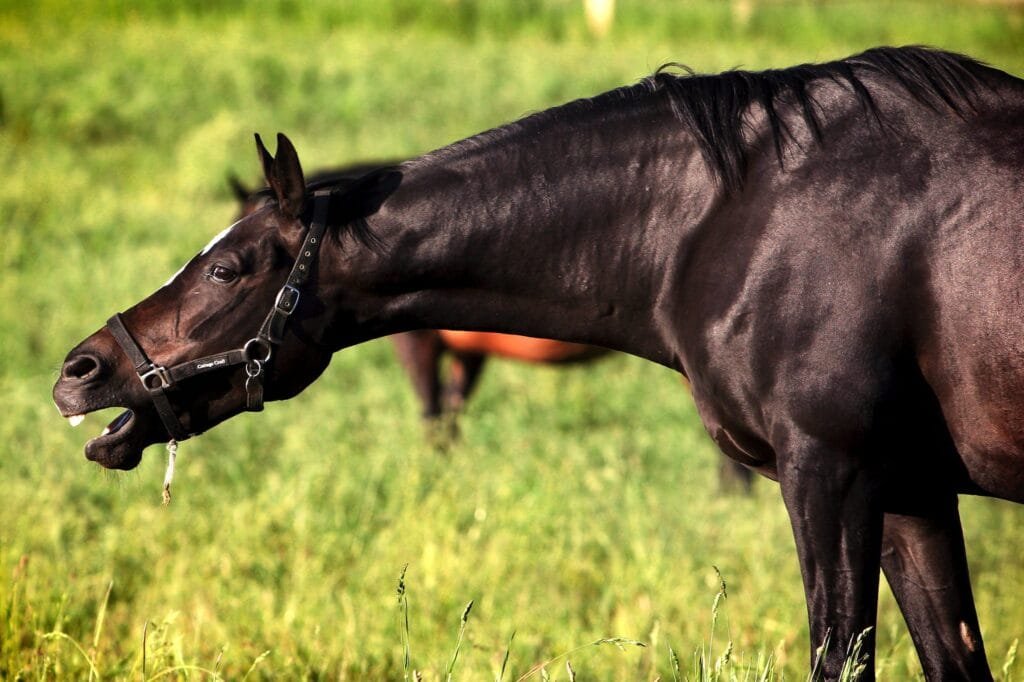What Is Choke in Horses?
Choke in horses is a condition that occurs when something blocks the esophagus, the tube that carries food from the mouth to the stomach. It’s similar to a person choking, but instead of affecting the airway, it affects the food passage. This can be a serious situation, and understanding choke in horses can help you recognize the signs and know how to respond.
What Causes Choke in Horses?
Choke usually happens when a horse tries to swallow food that is too large, too dry, or not properly chewed. This can happen if a horse eats too quickly, takes in a big bite, or doesn’t chew its food thoroughly. Horses are known to gulp down food, especially when they are very hungry, which can lead to a blockage.
Some common causes of choke in horses include:
- Large food items: Large chunks of hay, carrots, or treats can get stuck in the esophagus.
- Dry food: Hay or feed that is too dry may not go down smoothly.
- Eating too fast: Horses that are fed in groups or are given too much food at once may eat too quickly, which increases the risk of choke.
- Dental problems: Horses that have issues with their teeth, such as sharp points or missing teeth, may not chew their food properly, leading to choke.
- Old or damaged food: Sometimes, older or moldy hay or feed can be difficult to chew and swallow.
How to Recognize Choke in Horses
It’s important to know the signs of choke so you can act quickly. The most obvious symptom is difficulty swallowing or drooling. Other signs that a horse might be choking include:
- Coughing or gagging: The horse may make coughing or gagging noises as it tries to clear the blockage.
- Neck extension: The horse may stretch its neck out or twist its head to try to ease the discomfort.
- Pawing at the ground: Horses may paw at the ground or become restless.
- Bloating or discomfort: You might notice that the horse appears uncomfortable, especially in the chest or neck area.
- Lack of interest in food or water: If the horse is choking, it might not be able to eat or drink.
What Should You Do if Your Horse Is Choking?
If you suspect that your horse is choking, it’s important to act quickly but calmly. Here are the steps you should take:
- Stay calm: Horses can sense your anxiety, so try to stay calm and composed.
- Keep the horse still: Don’t let the horse keep moving around, as this could make the situation worse.
- Call your veterinarian: Contact your vet immediately. Choke can be serious and may require medical attention.
- Observe the horse closely: While waiting for the vet to arrive, observe your horse and note any changes in behavior or symptoms. This can help the vet understand the severity of the situation.
Treatment for Choke
Once the vet arrives, they will assess the situation and may try to clear the blockage. Common methods of treatment include:
- Using water or lubricant: The vet may use water or a special lubricant to help loosen the blockage.
- Endoscopy or tubing: In some cases, a veterinarian may use a flexible tube (endoscope) to look inside the horse’s esophagus and remove the blockage.
- Sedation or muscle relaxers: In some situations, the vet may sedate the horse to help relax the muscles of the esophagus, allowing the blockage to pass more easily.
In most cases, the obstruction will clear up with treatment. However, some cases may be more complicated and require additional care, especially if the blockage causes injury to the esophagus.
Preventing Choke in Horses
Choke is often preventable with some simple precautions. Here are a few tips to reduce the risk:
- Slow down feeding: You can slow down your horse’s eating by using a slow feeder or spreading out the food over a larger area.
- Soak dry hay or feed: If your horse is prone to choke, soaking their hay or feed with water can make it easier to swallow.
- Feed smaller portions: Feed smaller amounts of food more frequently throughout the day to prevent your horse from gulping down large amounts at once.
- Check dental health: Regular dental check-ups will ensure that your horse can chew food properly, reducing the risk of choke.
Conclusion
Choke in horses is a serious but often preventable condition. By understanding the causes, recognizing the symptoms, and knowing how to act quickly, you can help protect your horse from this uncomfortable and potentially dangerous situation. If you ever suspect your horse is choking, don’t hesitate to call your veterinarian. With prompt care, most horses recover fully from choke and can return to their normal routine.




